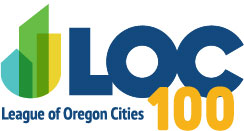LOC News
Treasury Guidance on CARES Act Funding Released
Late Wednesday night, the U.S. Treasury Department released guidance and a Q&A document for the $150 billion Coronavirus Relief Fund in the CARES Act. The National League of Cities (NLC), along with a coalition of local government organizations, have been advocating for weeks for direct funding to local governments for budget relief. Despite the NLC’s best efforts and advocacy, no funding was allocated for revenue replacement in the COVID-3.5 stimulus, and in-fact, the Treasury’s guidance specifically calls out that revenue replacement is not reimbursable under the CARES Act.
The guidance does provide quite a lot of detail for reimbursable expenses. The LOC will continue advocating for cost recovery with Governor Brown’s office and continue its federal advocacy on direct funding assistance for lost revenue. All local governments should be tracking their respective costs associated with the response to COVID-19. The LOC will be working with the governor’s office to get additional clarity and detail for local governments to use when determining impacts of COVID-19 on their service delivery.
Here are the top takeaways from the U.S. Treasury documents:
- A state can transfer payments to local governments provided the transfer qualifies as a necessary expenditure incurred due to the public health emergency and meets the other criteria of section 601(d).
- Governments do have to return unused funds to the Department of the Treasury if they are not used by December 30, 2020.
- Funds may be used to respond directly to the emergency as well as respond to second-order effects of the emergency, such as by providing economic support to those suffering from unemployment or business interruptions due to COVID-19-related business closures.
- The statute says that an expenditure must be "necessary." Treasury interpreted this term to mean reasonably necessary for its intended use in the reasonable judgment of the government officials responsible for spending fund payments.
- Funds may not be used to fill shortfalls in government revenue to cover expenditures that would not otherwise qualify under the statute. Many uses of funds are allowed, but revenue replacement is not one.
- The CARES Act also requires that payments be used only to cover costs that were not accounted for in the budget most recently approved as of March 27, 2020. The "most recently approved" budget refers to the enacted budget for the relevant fiscal period for the particular government, without taking into account subsequent supplemental appropriations enacted or other budgetary adjustments made by that government in response to the COVID-19 public health emergency.
- Treasury provides a long, nonexclusive list of examples of eligible expenditures.
- Payroll expenses for public safety, public health, health care, human services, and similar employees whose services are substantially dedicated to mitigating or responding to the COVID19 public health emergency.
- Expenses of providing paid sick and paid family and medical leave to public employees to enable compliance with COVID-19 public health precautions.
- Expenditures related to a State, territorial, local, or tribal government payroll support program.
- Expenses for public safety measures undertaken in response to COVID-19.
Nonexclusive examples of ineligible expenditures:
- Expenses for the state share of Medicaid.
- Damages covered by insurance.
- Payroll or benefits expenses for employees whose work duties are not substantially dedicated to mitigating or responding to the COVID-19 public health emergency.
- Expenses that have been or will be reimbursed under any federal program, such as the reimbursement by the federal government pursuant to the CARES Act of contributions by states to state unemployment funds.
- Reimbursement to donors for donated items or services.
- Workforce bonuses other than hazard pay or overtime.
- Severance pay.
- Legal settlements.
Contact: Jim McCauley, Legislative Director - jmccauley@orcities.org
Last Updated 4/24/20

